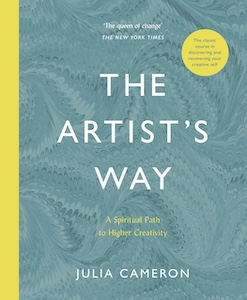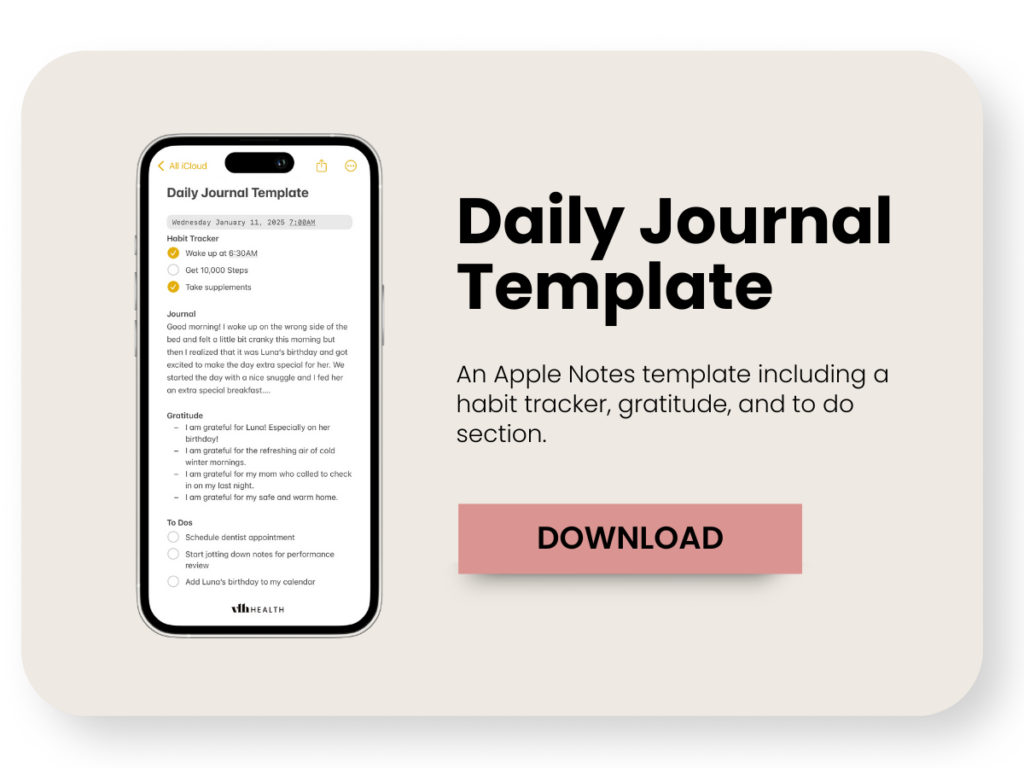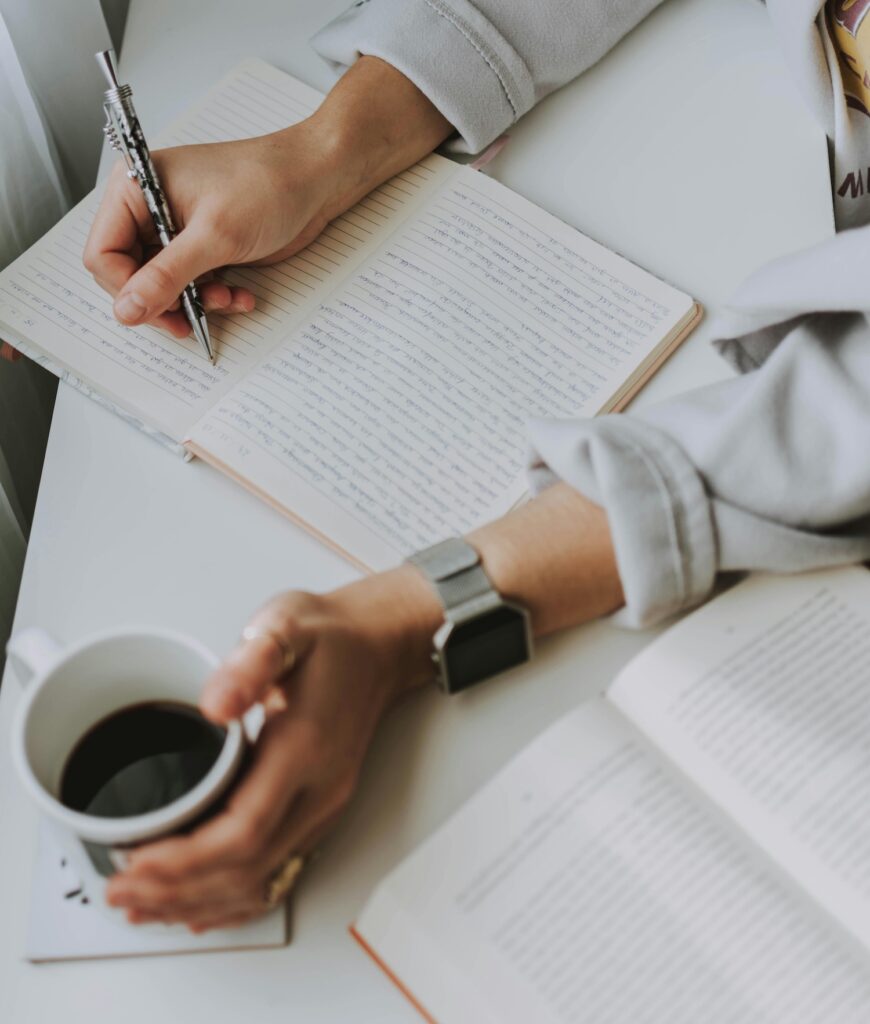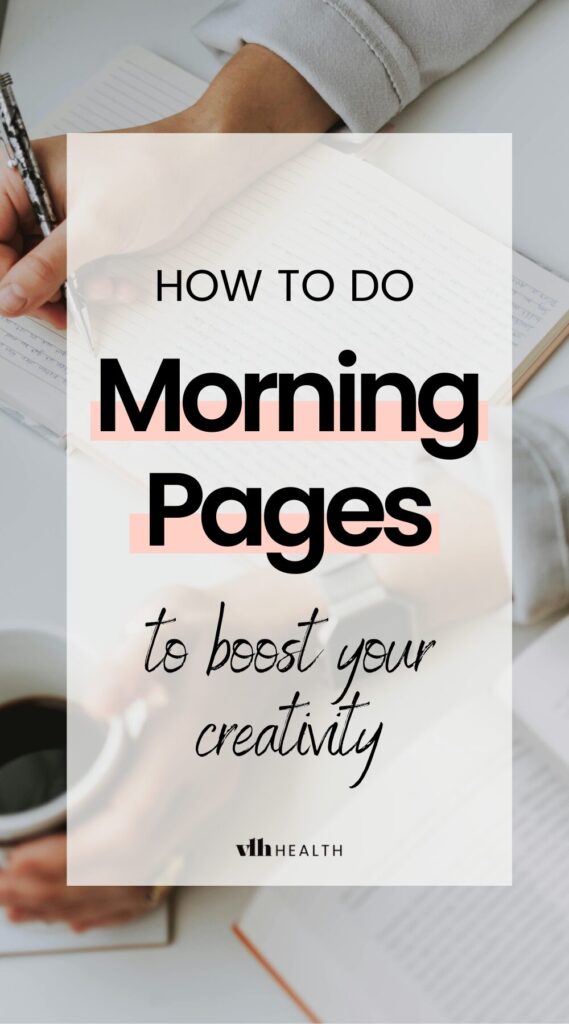What are morning pages? Developed by Julia Cameron in her famous book The Artist’s Way, morning pages are a simple stream-of-conscious journaling technique designed to enhance your creativity and connect with your greater purpose.
Are you one of those people who wakes up with a million thoughts racing through their mind? Morning pages might be an easy way to help start your mornings on a productive and relaxing note.
But what are morning pages?
Simply put, it’s a powerful journaling technique designed to help you clear your mind, boost your creativity, and enhance your overall productivity.
Originally developed by Julia Cameron in The Artist’s Way, morning pages have become a popular practice for writers, actors, entrepreneurs, and creatives all over the world.
In this guide, we’ll answer the question, ‘What are morning pages?’ and explain how they work and why you should consider adding them to your daily routine.

If you’re interested in learning more about morning pages, I highly recommend the Artist’s Way. It’s a guided journey into your inner world designed to help you connect with your inner artist and greater purpose.


Table of Contents
- What Are Morning Pages? (Definition & Origin)
- The Science Behind Morning Pages: Why They Work
- How to Do Morning Pages (Step-by-Step Guide)
- Benefits of Writing Morning Pages Daily
- Common Mistakes & How to Stay Consistent
- Morning Pages vs. Regular Journaling: What’s the Difference?
- Do Morning Pages Have to Be Three Pages?
- Morning Pages Prompts
What Are Morning Pages? (Definition & Origin)
Morning pages are a journaling technique where you write continuously for three pages putting your stream-of-consciousness thoughts on the page first thing every morning.
Julia Cameron developed this special technique to help artists (in the broad sense) clear their minds and unlock greater creativity.
Unlike traditional journaling, morning pages are fairly unstructured and typically don’t follow prompts, themes, or specific topics.
So you might be asking ‘Why three pages?’ Julia Cameron suggests this length because it forces you to go deeper than your surface-level thoughts, ultimately leading to more profound insights.
It’s important to try to write without judgment or criticism because this type of stream-of-consciousness writing helps to bypass the critical mind so you can give your subconscious some space to come through and express itself.
You can think of them as a brain dump to stop overthinking and create more mental space.
The Science Behind Morning Pages: Why They Work
You might be wondering, what are morning pages really doing for the brain?
From a scientific perspective, the benefits of journaling are many and span from physical aspects like improved immune function to mental health factors like reduced stress and anxiety. Here are a couple of the insights from studies on the science of journaling.
- Reduced Anxiety & Depression – A recent study on the effects of expressive writing found that participants experienced less anxiety and depression overall.
- Better Physical Health – By journaling just 15 to 20 minutes a day 3 to 5 times a week, participants in this study saw faster wound healing indicating the benefit to the immune system.
- Enhanced Cognitive Function – Journaling can help improve memory as well as reduce the risk of dementia.
- Stress Reduction – This study found that just one month of consistent journaling can decrease stress and anxiety while increasing resilience.

How to Do Morning Pages (Step-by-Step Guide)
Okay now that you know how to answer the question, ‘What are morning pages?’, let’s talk about how to do them.
1️⃣ Gather Your Tools – All you really need is a notebook and a pen but you can also explore digital options if that’s better for you.
2️⃣ Set Time Aside – It’s best to do your morning pages first thing in the morning to access your most raw and honest thoughts.
3️⃣ Let it Flow – Start writing without any judgment or editing.
4️⃣ Keep the Pen Moving – Even if you feel like you don’t know what to write, just keep writing.
5️⃣ Finish Three Pages – Keep going until you’ve completed the last line on your third page.
While there really isn’t a wrong way to do morning pages, the most important thing to keep in mind is filling up each blank page and doing your best to keep the negative thoughts at bay.
Benefits of Writing Morning Pages Daily
If you’re still wondering, ‘What are morning pages good for?’, here are a couple of their main benefits.
✔ Mental Clarity – Stream of consciousness writing helps you quiet the critical mind and give your subconscious some space to express itself.
✔ Boosted Creativity – Clearing out negative thought patterns and overthinking helps create mental space for creativity.
✔ Stress Reduction – By taking time to sit with your innermost feelings, you’re able to better process challenges as they come your way.
✔ Better Productivity – Having a daily accountability checkpoint helps you stay clear on your great purpose and motivations.
✔ Stronger Self-Awareness – When you start to see patterns crop up in your pages, you can better understand your limiting beliefs and fear-based thoughts.
Common Mistakes & How to Stay Consistent
Morning pages are a bit of a time commitment, taking anywhere from 20 to 45 minutes per day. Because of this, many people give up before they can fully see the benefits. Here are some tips to help you build a consistent routine:
- Put It In Your Calendar – Setting time aside each day will help you build the habit.
- Create A Cozy Writing Space – Having a cozy space set up will make the routine more attractive, helping you stay consistent. Make your cup of coffee and curl up in a comfy nook to write.
- Don’t Be Too Harsh on Yourself – You want to look forward to your morning pages but if you punish yourself every time you miss a day, you’ll develop a negative association. Long-term consistency is way more important than short-term perfection.

Morning Pages vs. Regular Journaling: What’s the Difference?
You might be asking yourself what are morning pages compared to traditional journaling?
Well morning pages are really just a type of journaling technique that involves stream-of-consciousness writing.
While many types of journaling involve prompts or even themes, morning pages are unstructured. You can think of them as your daily brain dump.
Do Morning Pages Have to Be Three Pages?
While Julia Cameron’s Morning Pages do have to be 3 pages, this journaling practice can be adapted to meet your goals and needs.
I recommend committing to three pages in the beginning because I think you will find that page one is all surface-level thoughts, page two goes a little deeper, and the real magic happens on page three. For me, this is where I run out of things to write and have to comfort the things I’m avoiding (eek!)
There’s a lot to be learned from this practice but it is a big time commitment. Over time, I’ve learned to jump into the deep stuff earlier so that I can keep my total journaling practice under 20 minutes.
Morning Pages Prompts
Julia Cameron’s “The Artist’s Way” has all kinds of prompts and reflections to get you thinking about your greater purpose (which I highly recommend checking out, btw!) However, morning pages are specifically a non-structured brain dump, and adding a prompt or specific question would turn it into a different kind of journaling exercise.
If you find yourself opening your journal and getting total writer’s block, try writing “I don’t know what to write.” until something comes to you.
It might sound a little crazy but I’ll bet that by the second or third time you write that sentence, some thoughts start flowing.
In case you are curious to learn more about the Artist’s Way, here are some of my favorite prompts from the book.
Write down a couple of negative thoughts ‘blurts’ about yourself that tend to crop up throughout the day. Convert those blurts into positive affirmations.
List out twenty things you enjoy doing (rock climbing, roller-skating, baking pies, etc). Next to each item, write down the date of the last time you let yourself do this thing.
Describe 5 traits you liked in yourself as a child and write a little about each and if it still appeals to you today.
List 5 people you admire whom you would feel safe praising publicly. Now list 5 people you secretly admire. What traits do these people have that you can cultivate further for yourself?
5 Ways Morning Pages Changed My Life
Back in 2021, I decided to join an Artist’s Way course as a way to do some self-development and connect with my greater passions and purpose. It was through this course that I discovered morning pages and I’m not exaggerating when I say they changed my life.
I have now been doing them daily (or more like 4 to 5 times a week if I’m honest) on and off for 4 years. Here are the ways that I feel they have improved my life and why and continue to make time for them in my daily routine:
- Daily Accountability — Sitting down and writing my pages every morning reminds me to check in with my goals and stay accountable to the small daily things that lead to long-term goal achievement. I really notice a big difference when I do my pages versus when I skip them.
- Self-Awareness — Noticing what I don’t want to write about gives me a lot of clarity into the things I’m avoiding in my life. Whether that is conflict with a family member, sitting with difficult emotions, or listening to my inner voice.
- A Slow Start to The Day — Taking 20 minutes to start the day writing is a great way to begin the day on a low-stress note and stops me from rushing through my morning routine and bringing that energy with me throughout my day.
- A Record of My Life –– Although I don’t treat my morning pages like a diary, I like knowing that I can look back at any time of my life and get a glimpse of what was going on, how I was feeling, etc.
- A Greater Sense of Gratitude — It’s not technically a part of morning pages, but I started to incorporate some “I am grateful for…” sentences at the end of each entry and I really notice that it shifts my mindset to one of abundance instead of scarcity.
Final Thoughts
Now that you can confidently answer the question, ‘What are morning pages?’, it’s time to open up your journal and get writing!
One of the biggest lessons from the Artist’s Way is that we so often stand in our own ways and sometimes you just need to get started and not give up till you reach your goal – or the end of your three pages.
Whether you want to clear your mind, connect with your inner artist, or simply build a new healthy habit, morning pages can be a transformative practice.
We’re curious if you decide to give them a try. Let us know in the comments below!
Happy journaling,

A small note to my readers – Over here at VLHhealth, we occasionally include affiliate links in our posts. This means that if you purchase using our links, we will earn a small commission at no extra cost to you.

Sources
Frontiers: Research on Expressive Writing in Psychology: A Forty-year Bibliometric Analysis and Visualization of Current Status and Research Trends
https://www.frontiersin.org/journals/psychology/articles/10.3389/fpsyg.2022.825626/full
National Library of Medicine: The durability of beneficial health effects associated with expressive writing
https://pmc.ncbi.nlm.nih.gov/articles/PMC4842937/
Journal of Writing Research: Expressive writing in school children: Effects on well-being and working memory
https://www.jowr.org/jowr/article/view/585
JAMA Network: Lifestyle Enrichment in Later Life and Its Association With Dementia Risk
https://jamanetwork.com/journals/jamanetworkopen/fullarticle/2807256
Cambridge University Press: Emotional and physical health benefits of expressive writing
https://www.cambridge.org/core/journals/advances-in-psychiatric-treatment/article/emotional-and-physical-health-benefits-of-expressive-writing/ED2976A61F5DE56B46F07A1CE9EA9F9F
National Library of Medicine: Online Positive Affect Journaling in the Improvement of Mental Distress and Well-Being in General Medical Patients With Elevated Anxiety Symptoms: A Preliminary Randomized Controlled Trial
https://pmc.ncbi.nlm.nih.gov/articles/PMC6305886/
You Might Also Like:
- What to Write In a Journal: Beginner’s Daily Journal Template
- What Is a Dopamine Menu & How to Make One
- 31 Healing Emotional Self-Care Practices Every Woman Should Know
Pin for Later!




Leave a Reply